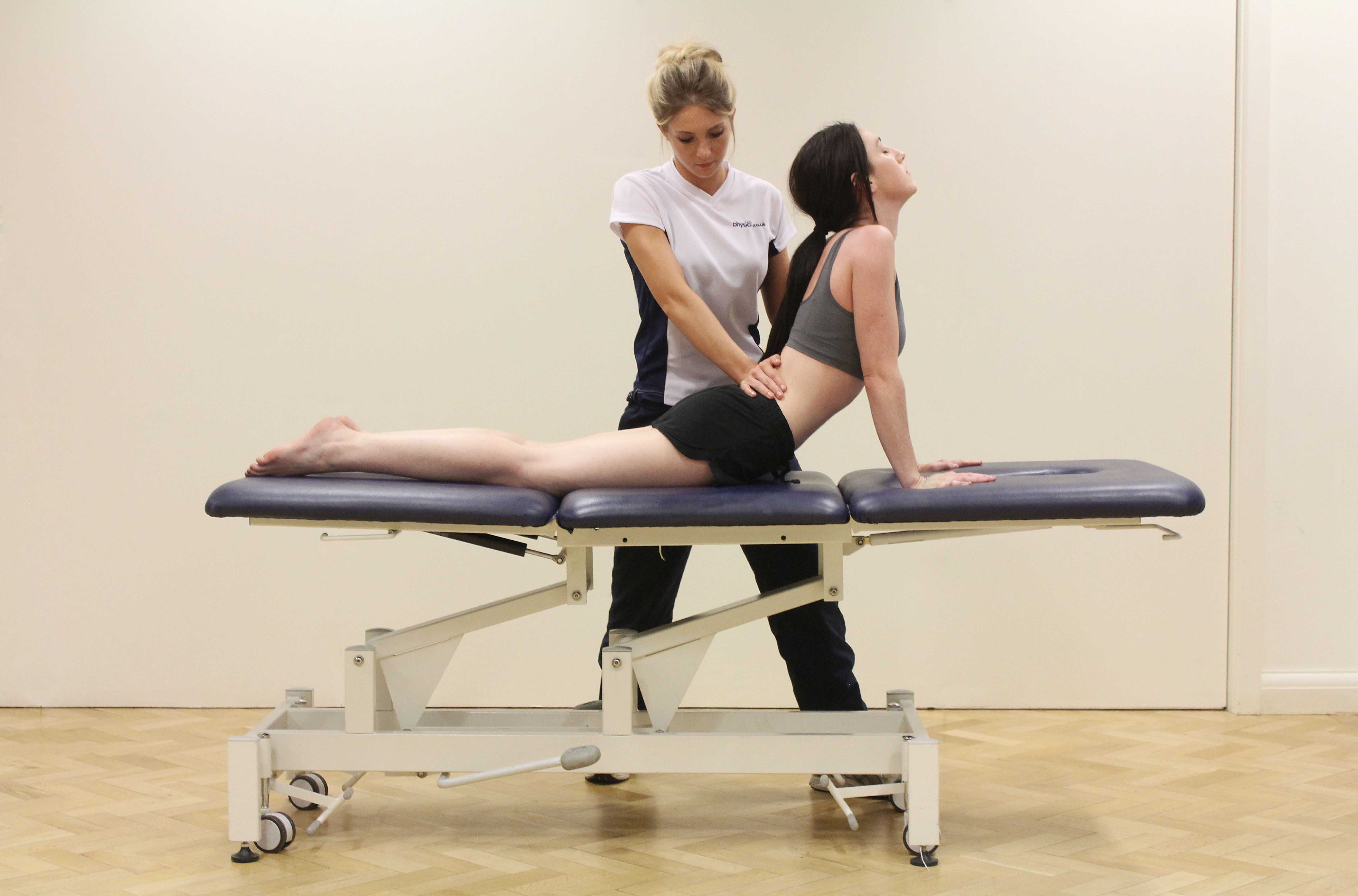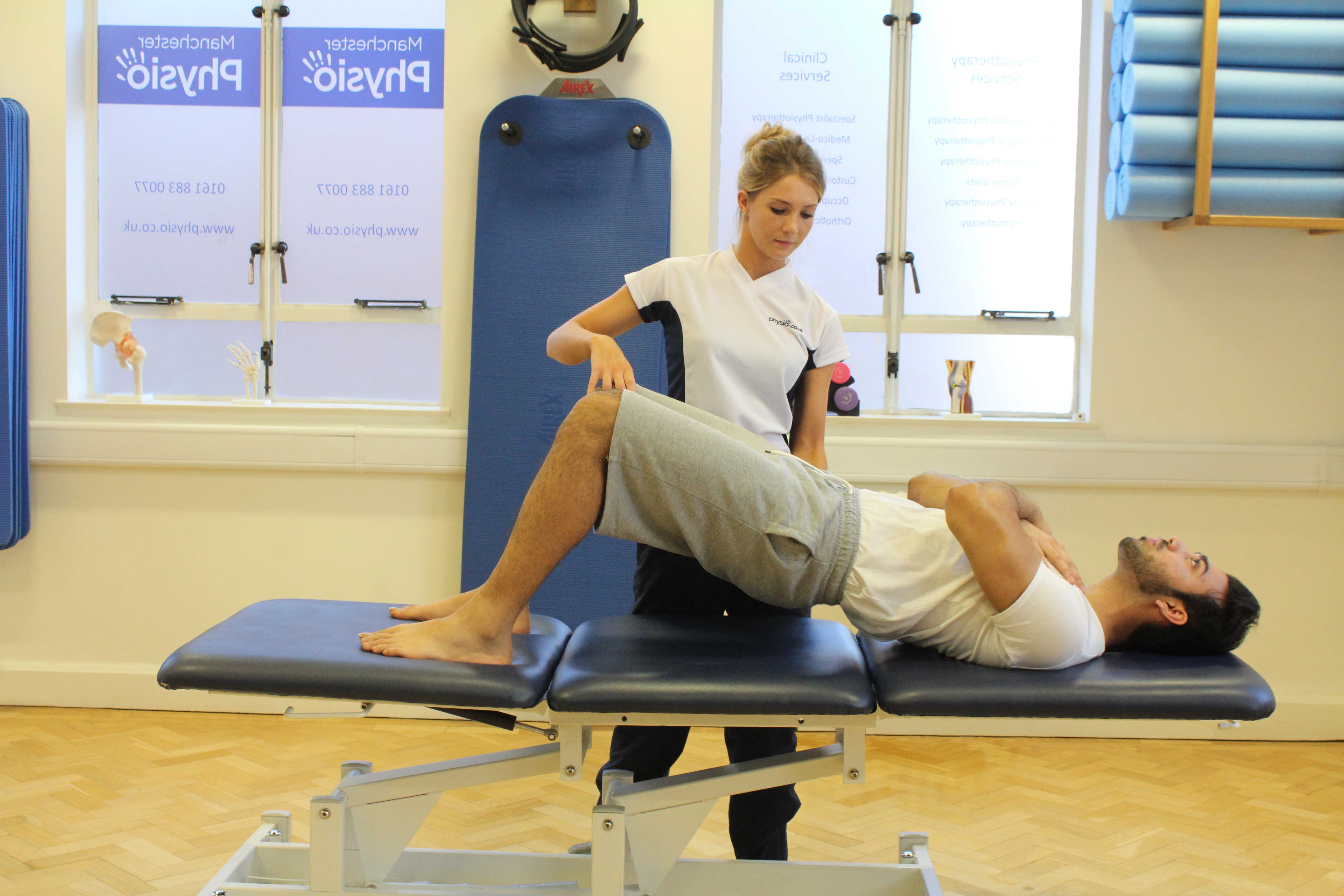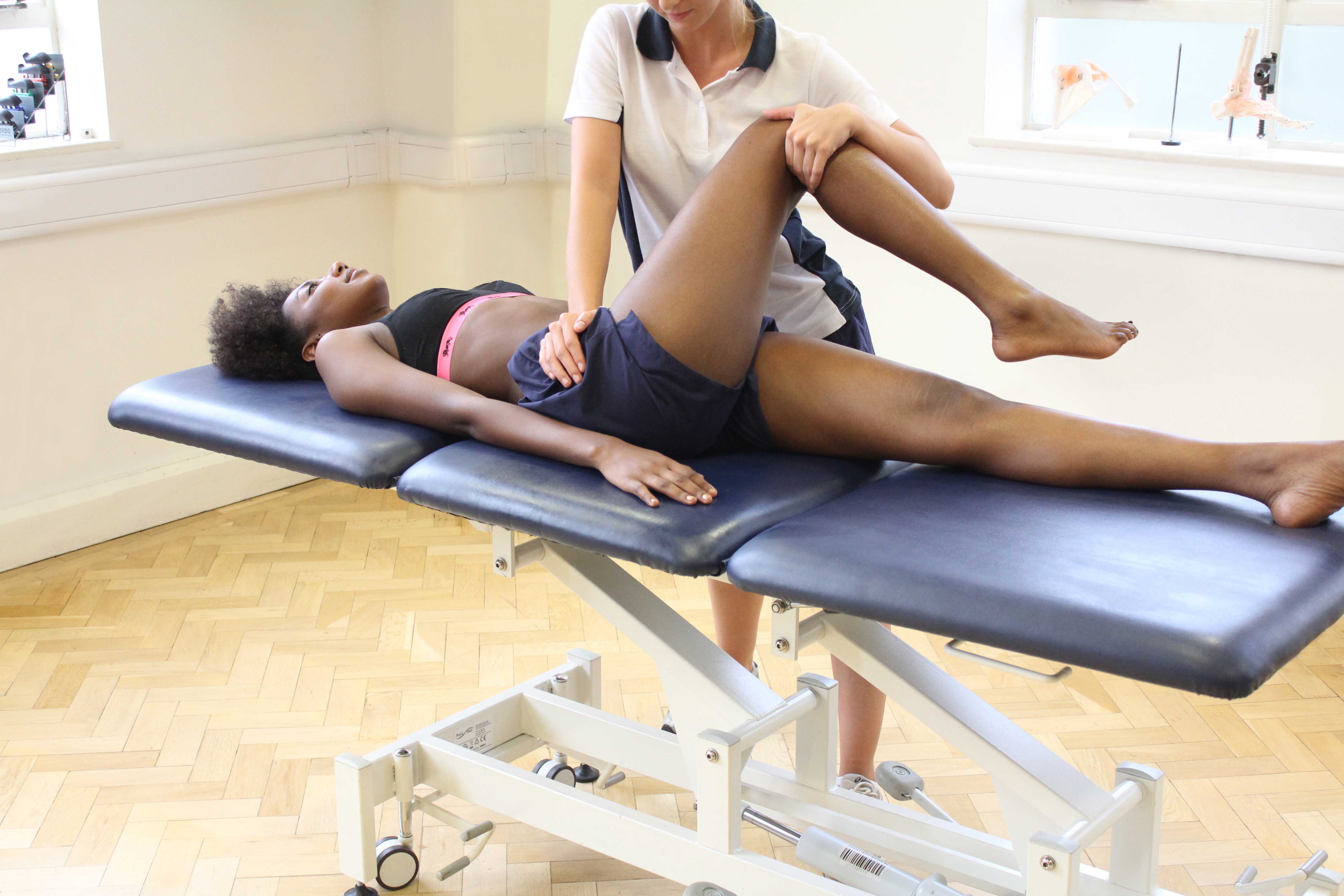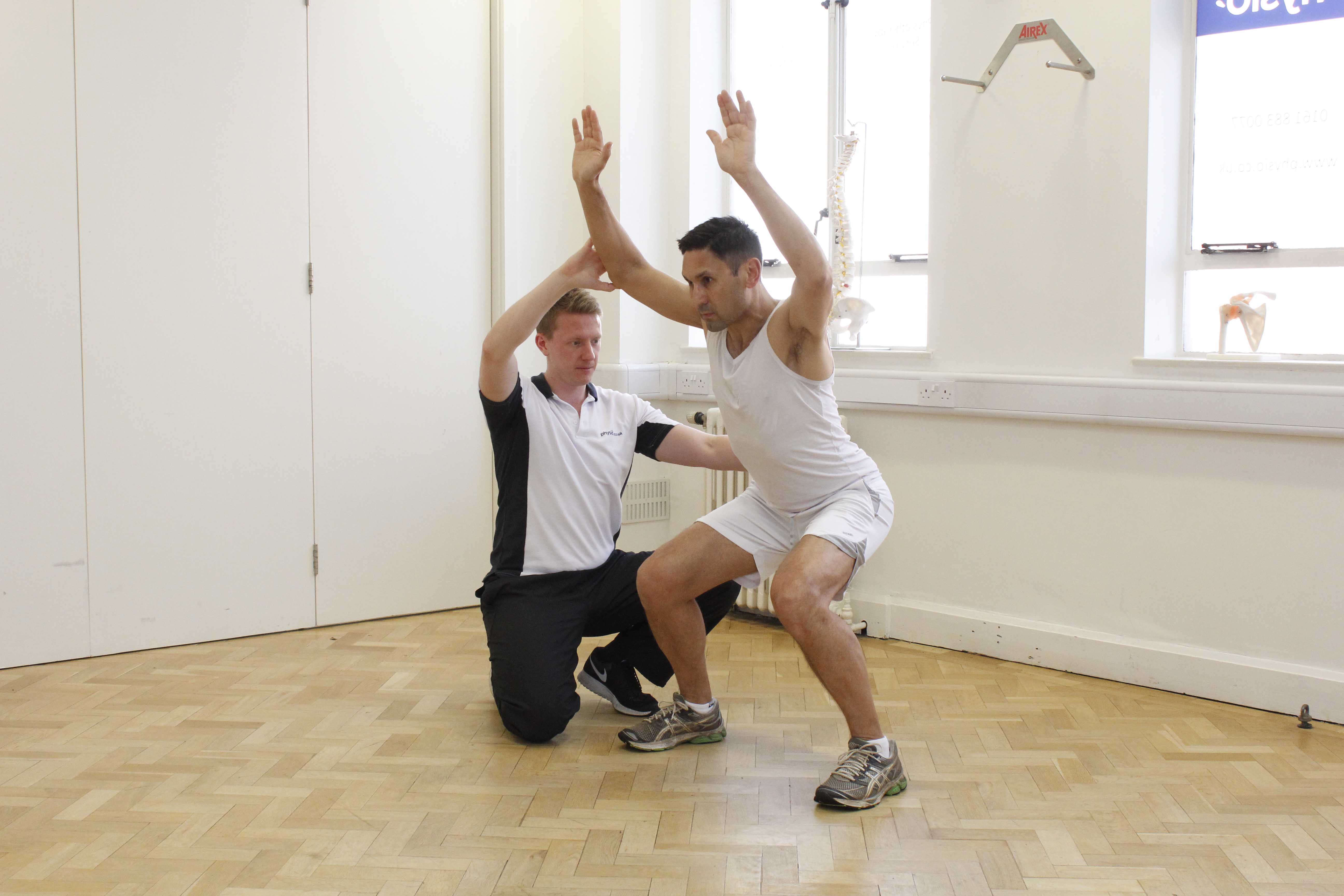 Above: Passive stretch of the hip and pelvic muscles by specialist MSK therapist
Above: Passive stretch of the hip and pelvic muscles by specialist MSK therapistThere are different classifications of perineal tears depending on the severity of your tear with first and second degree tears being the most common:
First degree: a tear that occurs only in the perineal skin
Second degree: involves the peroneal skin and muscles but not the anal sphincter (back passage)
Third degree: involves all of the peroneal skin, muscles and the anal sphincter. This category can be subcategorised into:
a. less than 50% of the external sphincter (a muscle at each end of the rectum which you consciously open if necessary)
b. a complete tear of the external sphincter
c. the internal sphincter (a muscle at each end of the rectum which automatically opens) is also torn
Fourth degree: a third degree tear combined with a tear of the anal epithelium (layer of tissue covering the anus)
There are several reasons that may increase the risk of a perineal tear during labour:
- A large baby (over 9lb)
- If forceps are needed to increase the space for delivery
- If an episiotomy is needed to facilitate the delivery
- If a perineal tear was experience during a previous childbirth
- Women delivering their first child
 Above: Strengthening exercises for the pelvic muscles supervised by MSK therapist
Above: Strengthening exercises for the pelvic muscles supervised by MSK therapistFor any classification of perineal tears, a physiotherapy programme created by Physio.co.uk can produce the following benefits:
- Pain reduction
- Reduce swelling
- Strengthen the pelvic floor area
- Reduce the risk of experiencing another perineal tear during childbirth
- Facilitate future childbirth
- Reduce the risk of long term problems
- Reduce the risk of incontinence problems
- Decrease bruising and bleeding
 Above: Passive stretch of the hip and pelvic muscles and connective tissues by specialist MSK therapist
Above: Passive stretch of the hip and pelvic muscles and connective tissues by specialist MSK therapistConservative (non surgical) treatment for perineal tears
If you have had a first or second degree peroneal tear, you will not require surgery as the healing will occur naturally. Physiotherapy is a very effective way to strengthen your pelvic floor muscles and facilitate the healing of the tear. Physio.co.uk can devise an individualised programme to help you with your recovery which may include:
- Pelvic floor strengthening exercises
- Cyrotherapy (ice) treatment to reduce any swelling
- Electrotherapy (Megapulse) to reduce bleeding and speed up the healing process
- Advise on positioning , lifting, getting in and out of bed and posture to reduce the stress on the perineum
- Strengthening exercises of transverse abdominis (the deepest layer of muscle of the stomach) to support to the back and pelvis region
- Advice on how to support the tear using pillows and positioning techniques
- Gentle massage to reduce pain and scar tissue build up of the wound
Surgical treatment for perineal tears
For third and fourth degree tears, your wound will have to be repaired using dissolvable stitches which do not have to be removed. The stitches will normally be dissolved after six weeks and most women do not experience any problems after this point. The operation will be performed under general anaesthetic or using an epidural (spinal) anaesthetic which will ensure that you don’t feel any pain during the surgery.
 Above: Strengthening exercises for the hip and pelvic muscles, supervised by MSK therapist
Above: Strengthening exercises for the hip and pelvic muscles, supervised by MSK therapistPhysiotherapy before perineal tear surgery
Although you will not be able to do a lot of physiotherapy before your operation, it is important to begin a few simple exercises to optimise your recovery and prepare you for your rehabilitation programme after surgery. This may include:
- Gentle pelvic floor exercises
- Cyrotherapy (ice) to reduce pain, swelling and brusing
- Electrotherapy such as Megapulse to reduce bleeding
- Preparation and advice for after your operation
Symptoms following perineal tear surgery
You may experience various symptoms after the operation which your physiotherapist at Physio.co.uk can help you to manage successfully. These could include:
- Temporary pain from the surgery
- Swelling
- A small amount of bleeding from the wound when you go to the toilet
- You may be unable to pass urine for the first few hours
- Bruising
Physiotherapy after perineal tear surgery
The specialist physiotherapists at Physio.co.uk will work with you to design a comprehensive rehabilitation programme which will facilitate your recovery from surgery and decrease the likelihood of future problems during childbirth.
Week 1
During the first week, your physiotherapy programme will concentrate on controlling your pain and gradually strengthening the pelvic floor area. Treatment at this stage will include:
- Pain control modalities
- Cyrotherapy (ice)
- Gentle pelvic floor exercises which will be taught slow and fast in order to target all areas of the pelvic floor muscles
- Simple transverse abdominis exercises
- Advice on your positioning to reduce pain and discomfort and ensure that the wound is able to heal effectively
- Advice on personal hygiene, bowel and bladder care and a healthy diet
- Specialist adaptations which you may need temporarily to help with various activities of daily living
Weeks 2-5
- You should now be carrying out your pelvic floor exercises regularly
- A progression of transverse abdominis strengthening exercises by increasing the number and doing them in different positions such as sitting and standing
- Increasing the amount of activities you’re doing such as brisk walking
- Continuing with techniques to reduce the pain and swelling
Week 6 onwards
The original stitches used to repair your tear should now all have been dissolved and pain and there will be little pain and swelling. Your physiotherapy programme at this stage will concentrate on you returning to your normal activities of daily living and hobbies without being restricted by your operation. All of the above modalities should be continued especially the pelvic floor and transverse abdominis exercises and these can be continued indefinitely to keep the area strong preventing future problems. An additional exercise which can be added at this stage is to squeeze your sphincter muscle and hold this contraction to try and reduce the chance of another perineal tear.
Summary
A perineal tear is a tear of the area between the anus and vagina due to childbirth. It can either be treated conservatively or surgically and physiotherapy is important following either option as an important part of your recovery. Recovery from a perineal tear is usually successful if a comprehensive and personalised physiotherapy programme is followed. The physiotherapists at Physio.co.uk can create a detailed rehabilitation programme which will meet your aims and goals and minimise the risk of any long term complications. To book a physiotherapy appointment, call Physio.co.uk on 0330 088 7800 today!

 0330 088 7800
0330 088 7800





































